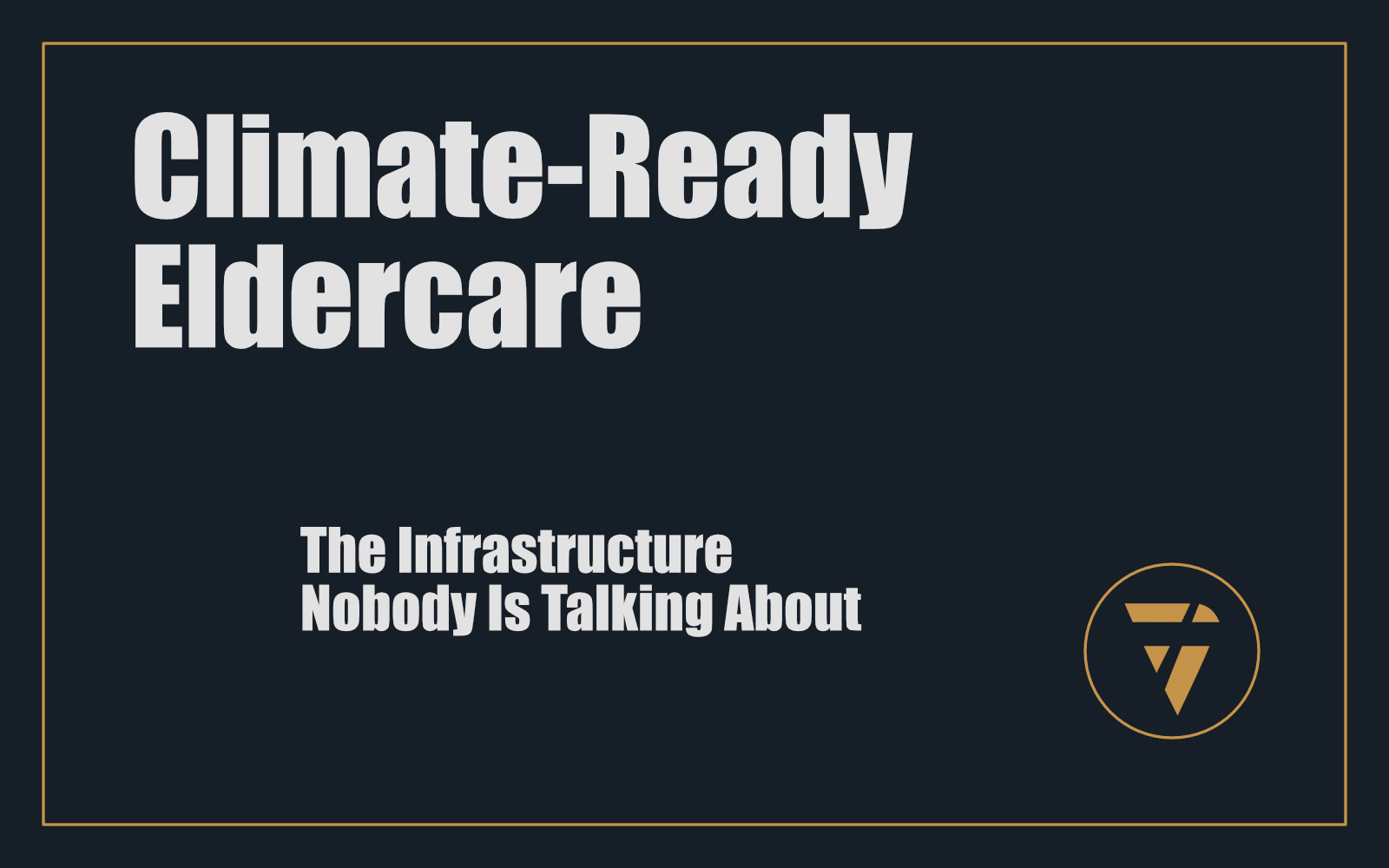Climate-Ready Eldercare

The Infrastructure Nobody Is Talking About
From the Table Series: Replacing Senior Housing with Human Infrastructure
When the power goes out,
what happens to your mother’s oxygen line?
That’s not a rhetorical question.
It’s the question thousands of families faced during the 2021 BC heat dome.
And the floods.
And the fires.
And the blackouts that followed.
Seniors in long-term care facilities were evacuated in wheelchairs.
Wheeled through floodwaters.
Sheltered in gyms, schools, basements —
anywhere with plugs.
This isn’t an emergency plan.
It’s surrender.
1. The Forgotten Vulnerable: Elders in Climate Crisis
Climate instability isn’t just heat and smoke.
It’s infrastructure failure.
And long-term care facilities are some of the most vulnerable systems in Canada:
- Over 90% are not equipped for sustained power outages
- Few have heatwave-specific HVAC systems
- Water access depends on municipal systems that may fail under duress
- Food logistics rely on just-in-time supply chains
- Backup generators—if present—are designed for hours, not days
These aren’t oversights.
They’re systemic blind spots.
Because in most climate planning, eldercare isn’t even mentioned.
2. The Cost of Invisibility
During the 2021 heat dome:
- 619 people died in BC
- 98% of deaths occurred indoors
- 56% of those who died lived alone
- Most had no air conditioning
- Many were already part of the LTC pipeline
These weren’t tragic anomalies.
They were predictable fatalities.
And they will happen again.
Because our long-term care infrastructure was built for maintenance, not resilience.
And maintenance can’t withstand crisis.
3. The Table Format Is a Climate-Resilient Care System
Every Table installation includes:
Power Independence
- Solar, geothermal, and battery backup
- Grid-optional energy supply
- Load balancing across care systems
Water Sovereignty
- Onsite treatment
- Complete waste water recycling
- Storage systems for long term autonomous use
Heat Resilience
- Passive House design envelope
- Triple-seal doors and windows
- Adaptive HVAC with backup circulation options
Food Security
- Onsite green production (greens, sprouts, herbs)
- Root cellar and dry goods storage
- Partnership with local producers for low-fragility inputs
Medical Continuity
- Embedded clinic with emergency protocols
- Refrigeration for medication
- Secure access to oxygen, resuscitation, trauma support
This is not a luxury spec.
It’s the minimum viable architecture for care during collapse.
4. Care Is Infrastructure — Or It Is Nothing
Every level of government needs to be investing in climate infrastructure now:
- Roads
- Energy grids
- Housing retrofits
- Emergency response centres
And still, eldercare remains siloed—treated as a health expense, not a system of survival.
This is a fatal error.
You cannot have a climate-ready community
if its most vulnerable people are housed in buildings that fail on Day One.
And most LTC homes will.
They were never designed to hold under shock.
The Table is.
5. This Is the Offer
The Table is not just a senior housing model.
It is:
- A heat dome survivability format
- A grid-failure refuge system
- A community health node under duress
- A clinical trial site during event-linked medical stress
- A sustainability benchmark for rural and semi-rural resilience
Care becomes a climate service.
Infrastructure becomes a health intervention.
And both are monetized as permanent, resilient yield.
Because when the climate breaks the world open,
only systems with both care and control will hold.
Summary
We don’t need climate-aware eldercare.
We need climate-ready eldercare.
That means:
- Not evacuating elders into harm
- Not depending on city power for life support
- Not needing transport to deliver sustenance
- Not trusting broken supply chains to hold life-critical pharmaceuticals
The Table holds through crisis.
Because it was designed to.
This is not about future-proofing.
This is about present reality.
And if your mother’s survival depends on what happens during the next blackout—
Then your infrastructure is either ready —
or responsible for what comes next.
This is what I’m working on. Tell me what you think, I enjoy the conversation! Subscribe and follow the work in real time.
Thanks!
B

When the power goes out,
what happens to your mother’s oxygen line?
Our care system isn’t climate-ready.
It’s evacuation-prone.
The Table is built to hold.
Power. Water. Food. Medical.
Because care isn’t a program.
It’s infrastructure.
PS -






